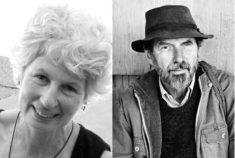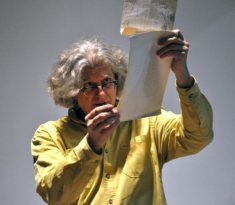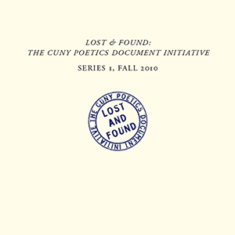Editor: Ammiel Alcalay
40 pages, softcover, saddle-stitch binding
Lecture and conversation with Allen Ginsberg from the landmark 1963 Vancouver Poetry Conference, with excerpts from the journals of the prominent Canadian poet Daphne Marlatt, chronicling her attendance as a student. Additional archival materials from Margaret Randall discussed in accompanying afterward.
Author Biographies:
ROBERT CREELEY was born in Arlington, Massachusetts in 1926 and died in 2005. He grew up in adjacent Acton and has often written of the very particular qualities of life there. In 1943 he entered Harvard University only to leave for the American Field Service and duty in Burma and India from 1943 to 1944. Although he returned to Harvard, he ended up getting a degree from Black Mountain College where he also taught. Establishing the Divers Press in Mallorca, Creeley’s work as an editor and publisher were instrumental in defining new forms of American literature, as was his intense correspondence with Charles Olson through which, among many other things, they came to define a very unique notion of the “postmodern.” Teaching would become a beloved vocation and he taught in many places, to many ages, and in many contexts, finally settling into a long-term position at SUNY Buffalo where he stayed from 1967 to 2003, only leaving then to accept a position at Brown in Providence, Rhode Island. The relationship of Creeley’s work to his life is intricate and vast, a kind of archipelago of intimate and sustaining relationships, with all the difficulties implied, that may come to define an age. Embedded in his poems, prose, critical work, and correspondence, we can find a history of American literature in the second half of the 20th century written more densely than in almost any other source one can think of.
Poet, novelist, essayist, and editor DAPHNE MARLATT was born in Australia in 1942 after which her family moved to Malaysia before settling in British Columbia when she was nine years old. Educated both in Canada and the United States, Marlatt was profoundly affected by her encounters at the 1963 Vancouver Poetry Conference. Taking that experience to heart, her work has consistently pushed at the borders of form and subject, and at the limits of personal, political, historical and sexual identities or conditions. In a 1979 interview with George Bowering, Marlatt said: “I love that phrase, the body of language. And I’m trying to realize its full sensory nature as much as possible. We live in the world. That’s my basic assumption. I don’t want to get out of this world. I want to learn everything I can about what it is to live in this world, to be mortal, which I take to be in the body.” Her earlier relationship to place, reflected in such works as Vancouver Poems (1972) and Steveston (1974), when she stated “I’m interested in the interaction between the eternal & what’s time-bound, & what’s particularly local,” gets taken to even further lengths in her novel Ana Historic (1988). Here desire itself has a history as Marlatt weaves many different sources into a complex reimagining of limitations. While celebrated in Canada, Marlatt’s work is not well enough known in the United States, particularly given the strong affinities she had, at a crucial point in her writing life, for American writers.
Selected Archives:
- PennSound: http://writing.upenn.edu/pennsound
- Thomas J. Dodd Research Center, University of Connecticut, Storrs, CT
- Personal Archives (Ammiel Alcalay, Margaret Randall)


